Travel Blog
The author is a travel and feature writer. This is an account of her expat years. Names have been fiddled with to avoid offence but most of what you’ll read here is true. She loves the UK, but hopes to live abroad again before she’s of pensionable age.
Part 27
Background
In 2006, a family of Simpsons from the East of England moved to the Middle East. For the purposes of this story-in-parts, and to allow a little distance from Mr, Mrs and the three mini Simpsons (boy, girl, girl), they will now be referred to as Marge, Homer, Bart, Lisa and Maggie – their Springfield counterparts. When they moved across the world, this Marge and Homer were in their forties, Bart was 13, Lisa was 10 and Maggie was four.
Year 4 – Dubai
November 2009
*
From: xxsimps@aol.com
To: xxxx@motivate.ae
Sent: Sun, 1 Nov 2009 13:13
Subject: Marge Simpson, British writer
Dear Xxxx,
I am wondering if you are either looking for an additional part-time member to add to the editorial team of Emirates Woman, or for an additional freelance writer…
*
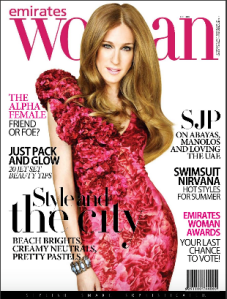
Emirates Woman Magazine
It’s the first day of November, and Marge pats herself on the back. Another email fired off to an indifferent editor. Plenty more to go… If she does this every few days, the law of averages deems it only fair that eventually one of them might respond…
If she could only get over her guilt at not working or earning any money, she might enjoy her free time more. Up to two Pilates classes a week. Her body’s never been so grateful.
But her desire to write a masterpiece burns strong. Homer’s words – ‘Do you know how?’ have fanned the flames. She’s written for Grazia. She got an A* for a seven-page story she wrote when she was fifteen. ‘It was a beautiful day. I dived into the water. I knew I swam well…’ (An underworld, scary mind-control, an escape scene… It got more interesting). How hard can a 100,000-word book be?
She searches her computer for the folder she created in Bahrain: ‘Novel.’ In it, a single file: ‘First Idea for Story.’ Two pages. Not awful. Not great. The last paragraph contains the kernel of the idea on which the novel will eventually be based. A little self-consciously, although there’s no one there to see, Marge flexes her creative muscles and writes the next line.
Three hours later, Marge has managed to squeeze out five more pages. Giving birth to quintuplets without pain relief would have been easier. Her brain aches and not just from trying to find words of more than one syllable. The fact is – she knows zilch about the book’s subject matter and hasn’t a clue how to write a novel. Mere details it is true. But galling nonetheless. Nevertheless, she will not be defeated. She’ll come up with a plan.
Though not right now. For back in the real world, or at least the tangible one in which she now resides, Marge is confronted with a Parenting Issue and her mothering skills are being brought into question.
Toothache, because of or in spite of the industrial-sized bucket of recently trick-or-treated Halloween sweets, has Marge on an urgent mission to find Maggie a dentist. The surgery most recommended by other school mums is on Beach Road (approximately 20-km long), nestled somewhere among more plastic surgery clinics than there are actual kilometres.
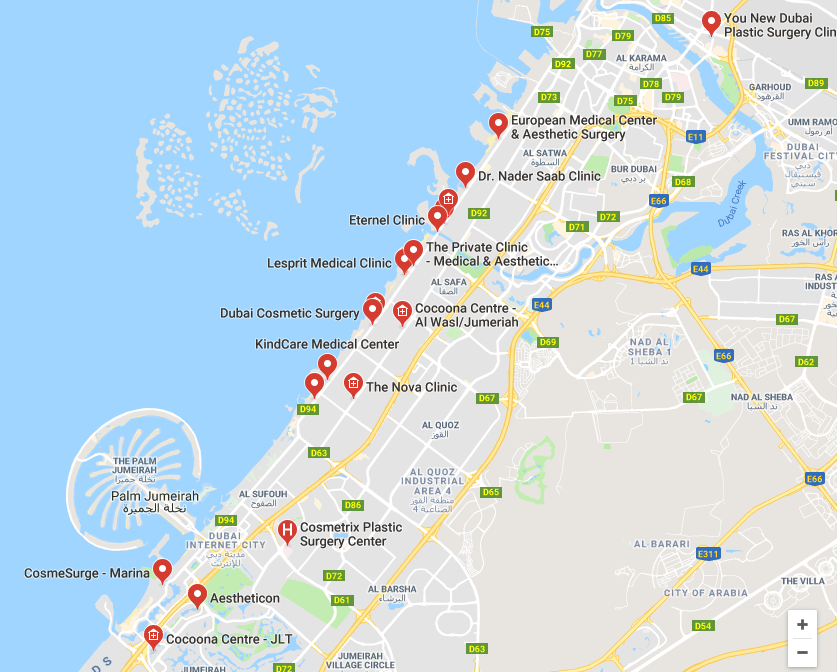
Beach Road and Plastic Surgery Clinics
In four years time, for all the wrong reasons, Marge will have cause to visit one of these, but for now, she speeds up Beach Road and back down Beach Road, past every single one, until she finds what turns out to be the Burj Al Arab of dental surgeries. Glossy and glamorous, shiny-white as the receptionists’ teeth, with polished wooden floors and light fittings to cause Marge some serious my-house-is-nicer-than-yours envy, greeted by staff who could have stepped out a Vogue fashion spread, this is nothing like the NHS clinic she is used to back home.
Upon some gentle questioning, from the paediatric dentist so handsome, so Scandinavian that Marge is only sorry she didn’t encourage Maggie to eat more sweets and gain more cavities sooner, it comes to light that this is only Maggie’s second time in a dentist’s chair. After Bahrain, where a trip to the dentist made the scene in Marathon Man seem like the Teddy Bears’ Picnic, Marge, who won’t be up for Mother of the Year award, made the executive decision that unless it was a matter of life or death, dental check-ups would have to wait until they returned to live in the UK.
Homer, not as invested in hunky dentists as Marge is, has something more interesting to share. He works with the British Ambassador’s wife. She’s organised a live band in the Embassy gardens. Would Homer and Marge like to come?
“I said yes, of course,” he finishes, anticipating Marge’s joy.
“But who’ll look after Maggie?”
Homer can’t understand why Marge is like this.
Marge can’t understand why in 2009, their roles are still so mired in the fifties. In her next life she’s coming back as a man. Then she’ll be able to accept invitations at the drop of a hat, and not allow small things like childcare get in the way of her rightful happiness.
Marge must, once again, ‘ask around’. Most people have live-in maids, solving their babysitting dilemmas instantly. Marge, stubborn to the last, is still trying to keep it real-ish, and unlike Bahrain, where all the maids in their little road would step in at the drop of a hat, she doesn’t yet know her neighbours well enough to ask a similar favour… Apart from the one a few doors down who has reached out a few times. Her eldest in Maggie’s year, she is lovely and welcoming, delighted to help. Would Maggie like to do a sleepover? Or if not, then of course one of her maids can babysit. Whatever Marge prefers.
Marge would be more than happy for Maggie to do a sleepover – if that’s what Maggie would prefer. Then Marge could go out without a worry in the world. Maggie likes sleepovers. In Bahrain she and her best friends lived in each other’s houses. Here, however, she has not yet made a special friend of her own. She is sad most days. She’s in tears every bedtime. No. She doesn’t want to do a sleepover. In fact she doesn’t want to go to school anymore.
“What is it that you don’t like?” Marge asks.
But there isn’t any one thing. It’s lots of little issues. Maggie wrote a poem in class about her dad. The teacher thought it was so good he read it out then put it up on the wall. The children laughed and Maggie was embarrassed. In the playground some children bumped into her and she got hurt. A girl in her class pushes her around when she wants her own way. Marge knows there are nice children too, and that Maggie is popular – she’s been invited to several parties, and has friends to play with at break time. But nothing can comfort her. She is inconsolable.
Marge is heartbroken. A night out in the Embassy gardens does little to cheer her up. She can’t bear to see Maggie so sad. Maggie – who spent the previous three years with a smile on her face.
Marge thinks it’s time for Hayley the Heart Fairy to pull her finger out.
Back in Bahrain, Maggie had a Tooth Fairy and a Heart Fairy, both of whom used to write her regular, lengthy letters. The Tooth Fairy to thank her for her beautiful baby teeth. The Heart Fairy to bring news from Fairy Land and boost morale whenever required. Hayley (preoccupied with trying to find a job, a dentist, a babysitter, her way) has been remiss in the letter-writing department.
“Do you think Hayley has a new human?” Maggie asks Marge through her tears.
“I very much doubt it,” Marge replies. “Heart Fairies only ever have one human for life.”
The next evening, to Maggie’s joy, there, on her pillow, is a long letter from Hayley.
‘I’m so sorry I’ve not written for so long, I have also been moving house – down the street, and moving school. Isn’t it hard moving to a new school, but I’ve been watching you, and I have to tell you, I think you are going to be a very popular little girl. All the children in your class seem so nice and I’ve heard that they all think you’re really lovely. You must be so proud of yourself for finding your feet so quickly in a new school and a new country. It must be harder to move country than just move street, so I think you’re doing really well…’
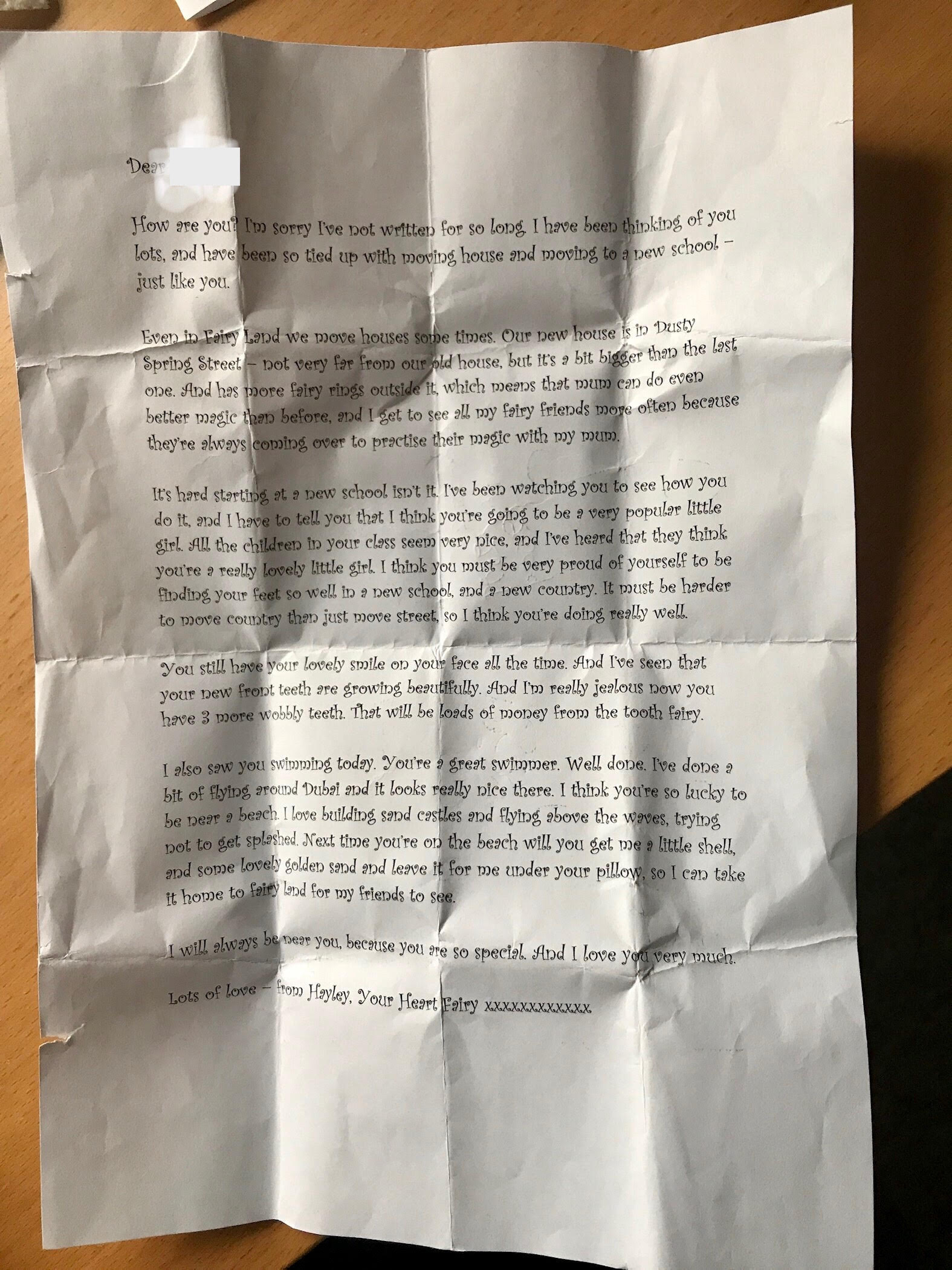
Hayley the Heart Fairy’s Letter
For the first time in weeks, Maggie falls sleep with a smile on her face.
Fairies of the godmother variety figure in Marge’s life too. Grazia’s Deputy Editor, and her flatmate, who (along with the ambassador’s wife) also works with Homer, invite Marge out for cocktails and sushi. The Deputy Editor is leaving Grazia at the end of the week – she’s had her fill of the difficult editor. The flatmate works in media search. Their third flatmate is the editor of Time Out. They know everyone who’s anyone in publishing in the UAE. Between them, they will help Marge find a job.
While she is waiting for this miracle to happen, Marge visits Friend From the School Gates [FFSG]. She lives on the Palm, which sounds glamorous, but somehow it’s not. High-rise apartment blocks overlook strips of manmade beach, or, if you’re the Beckhams, low-rise houses with your own little patch of beach and a mooring facility for your boat. With one road on and off the Palm, rush hour, the school commute, and weekends when tourists come, mean end-to-end traffic jams from Atlantis all the way to the main road.
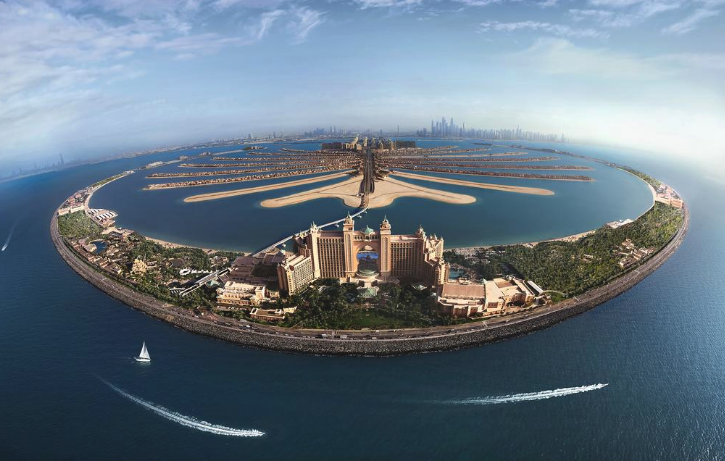
Atlantis and The Palm
Atlantis, a hotel and resort of unparalleled bad taste, looms COLOSSAL at the end of the Palm. The size of 64 football pitches, it has 23 restaurants; an 11 million litre marine habitat and one of the top 10 largest aquariums in the world with 65,000 marine animals and over 250 species of fish. Its signature Royal Bridge Suite is a snip at US$27,000/night. Costing US$1.6 billion to build, the resort has zero architectural merit and rises out of the sea like a flamingo pink version of the Russian Kremlin with a phallic-shaped hole in the middle. Inside, it is as intimate as Heathrow Airport, the first week of the summer holidays.
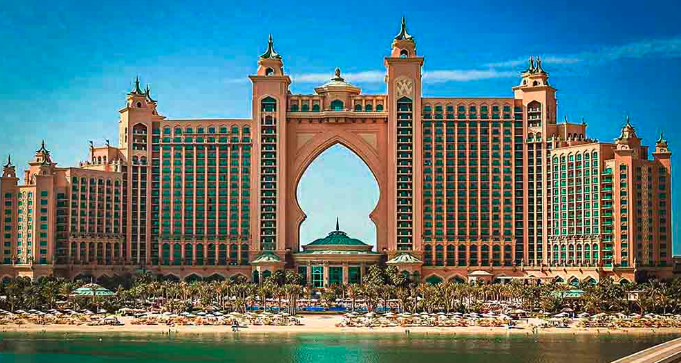
Atlantis
But what sort of mother would Marge be to deny her children a trip to Ambassador Lagoon and the Lost Chambers Aquarium, which, to be fair, are well worth a visit. Or Aquaventure Waterpark (18 million litres of water in the desert), the Best Thing Ever as far as Bart, Lisa and Maggie are concerned. For Marge, it is not the best thing ever. Water. Contact Lenses. Queues. Crowds. Just not.
Back in Umm Suqeim, Marge appreciates her compound. She has the privilege of being part of a community of families from the UK, South Africa, Spain, France, Turkey, Iran, India, Italy, Germany, Holland, Denmark, Australia… (the ones she knows about). At the kiddies’ park, packs of children of all nationalities play together, speaking their own language with their compatriots and English to everyone else. What Marge likes less is the fact that she is the only mother to accompany her child. All the other children are with their maids. Park duty is clearly one of the more popular chores; a rare occasion when they can be outside and sit and chat, in the name of work.
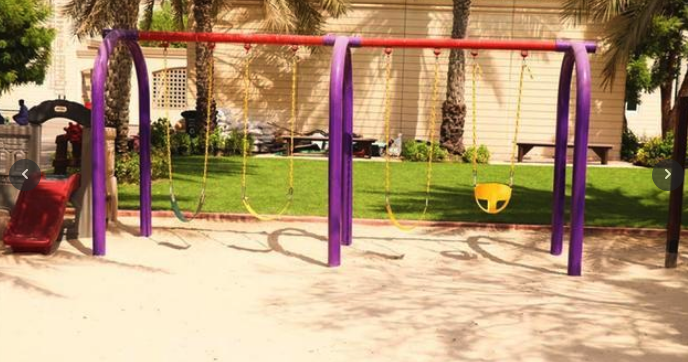
Sidra Village Kiddies’ Park
Bart turns 17, convincing Marge and Homer that he should have a party. Before Marge is fully cognisant of the risks of drunk teenagers in a country where the legal drinking age is 21, and because from the age of 13 to 16 Bart lived in Bahrain where teens congregated on each other’s compounds for weekend gatherings, and didn’t seem to get too off their faces, (or because Bart has so far played Marge wisely and has not yet been drunk in front of her, though he will more than make up for that), and because the weather is warm and the kids can sit out in the garden while Marge and Homer can keep tabs, hidden away in the house, they agree. In the event, possibly a first and last, not only does it remain in hand, but Bart actually clears everything up afterwards. This might be something to do with the fact that he has a nice girlfriend to keep him in check, but whatever the reason, on this occasion, he gets all the brownie points.
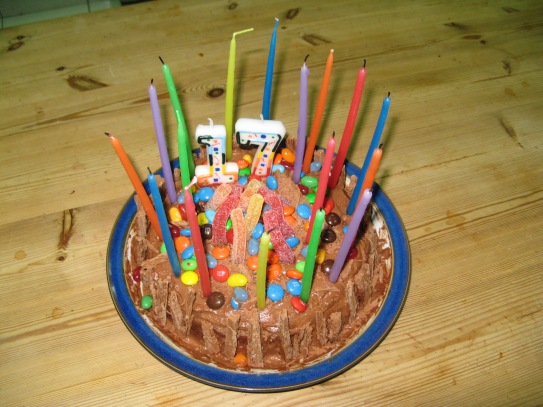
Happy Birthday Bart!
At school, the children must each select two subjects for after-school studies. The Women’s Institute asks when it can have Maggie back (Cooking and Gardening). Lisa opts for Jazz Dance and Drama. And Bart, who three years earlier thought expat brats were an alien breed, chooses Skiing (in a shopping mall).
A tentatively planned weekend in Bahrain at Eid is decided against. After receiving a travel ban when they lived there, because Homer told his company they had to pay a football team from Europe for coming out to the kingdom to play a match, and consequently upset his bosses very much, he is nervous about returning in case they lock him up and throw away the key. The children are disappointed, particularly Maggie, who was counting on the trip to make life worthwhile again.
“It’s not fair!” she weeps. “You always ruin everything.”
“I have an idea!” Homer says far too fast. “Let’s get a puppy.”
Maggie halts mid-sob.
Marge freezes, her eyes sending Homer the sorts of messages that are best not vocalised.
“How about we discuss this?” she finally manages through gritted teeth.
“You promised us a puppy when we moved here,” Maggie wails. “You can’t break all your promises?”
“Yes Mum!” says Bart.
“Yes Mum!” echoes Lisa.
“Yes Marge,” nods Homer. “We did promise them. And I love dogs. Just love them. Always wanted one. I’m a natural.”
Marge, heart plummeting to her flip-flops, eyes the hopeful faces. Something about this logic doesn’t add up. Homer wants a dog, not Marge, but Marge will be the one who has to look after it. On the other hand, a happy Maggie is a very appealing prospect. Trying to quell her misgivings, she agrees that they can get a puppy. After Christmas.
The following weekend, someone FFSG has befriended, whom Marge has met once, invites Marge and Homer for dinner. She has, she declares, psychic powers. She picked up vibes from Marge the first time she met her. As for Homer, he has a tall man standing behind his right shoulder. And FFSG’s husband is full of pent-up energy. That all cleared up, she proceeds to argue vehemently with Homer that they’ve got it right in the Middle East. Capital punishment needs to be reintroduced in the UK. An interesting evening, and a reminder that, as in Bahrain, they will have to kiss a few frogs before they make some decent friends…
One morning, Marge is pleasantly surprised to receive a phone call from InsideOut – an interior design magazine affiliated to Gulf News. Would Marge like to freelance for them?
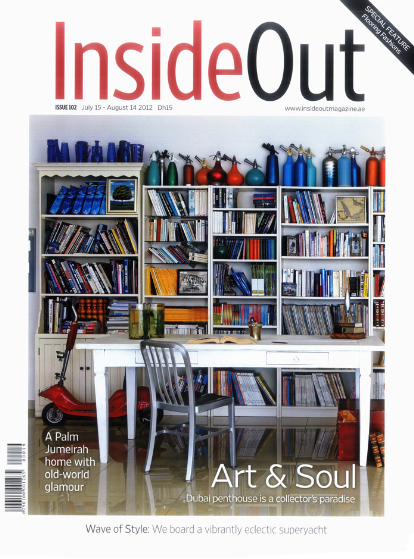
Inside Out magazine
“Absolutely,” replies Marge. “What would you like me to write?”
“Up to you,” the editor replies. “Come up with the ideas, find the stories, source the interviewees and write up the pieces. If we decide to publish, we’ll pay you.”
Marge considers this for all of about five seconds. She’s not doing all that work without some guarantee of payment. She emails the editor with some ideas and asks for a little direction. Have these been done before? Is this the sort of thing you’re after?
The editor doesn’t respond to Marge’s questions. Instead she suggests Marge goes to the opening of an envelope. (Not really). The opening of a kitchen shop. (Much the same).
“Think of the freebies,” a friend points out.
What – a wooden spoon? A non-stick spatula? Tempting. But it clashes with Bart’s birthday and a Saturday night. Marge must regretfully decline.
“In that case, could you write me a 1000-word piece on Contemporising Emirati Design? We’ll pay you a dirham a word.” The editor finally acts like an editor.
Not that Marge will be booking her round-the-world trip just yet, but it’s a start. It will involve three days at INDEX – the UAE’s largest Interior Design Fair, to schmooze with the movers and shakers of the design world.
Marge isn’t an expert on interior design. Obviously she has a house and she’s decorated it. But she doesn’t read interiors magazines on account of the fact that seeing other people’s perfect homes makes her very discontented. (Also, why, in every picture, are these people always barefoot? Is the too-cool-for-shoes vibe a requisite interiors thing? Will everyone at the Design Fair be beautifully dressed but shoeless?)
And then there’s the vocabulary. She’ll have to learn a whole new language.
She did it for art in Bahrain – a distinctive, multi-syllabic lexicon [radical, space, tension, autonomy, nuance, creation, perspective, visuality, versatility, aesthetic, spatial, non-spatial, elegant, dimension, reality, contemporary, conflict, harmony, symbolic, a multitude, myriad, intricate, delicate], and for fashion, perfume and makeup [sartorial, elegant, simplicity, clean lines, pop of colour, playful, bright, bold, exciting, simple, minimal, urban, fierce, vibrant, fresh, mouth-watering, sensual, seductive luscious, harmonious, aroma, scent, fragrance, hints, top notes, infusions, revolutionary, lusher, firmer, brighter, silky, plump].
Interior Design Speak is just more of the same… [bespoke, reclaimed, chic, shabby chic, timeless, well-appointed, traditional, contemporary, retro vibe, luxurious, opulent, dramatic, modern, aesthetically, cosy, textured, industrial, serene, elegant, signature style, understated, layers of pattern, sophisticated, uplifting, homely, smart, dramatic, multi-functional, tactile accents, eclectic, quirky].
Investing in a dictaphone, to Marge’s dismay, the On/Off/Play/Record buttons she was so adept with on the borrowed dinosaurs at Bahrain Confidential are nowhere to be found. It’s not even a dictaphone, it’s a Digital Voice Tracer with buttons resembling the climate control system in a car. Even turning it on is impossible. There are folders and files, a menu, a screen and many slow, slow, quick, quick slow buttons. Marge is stressed before she’s begun.
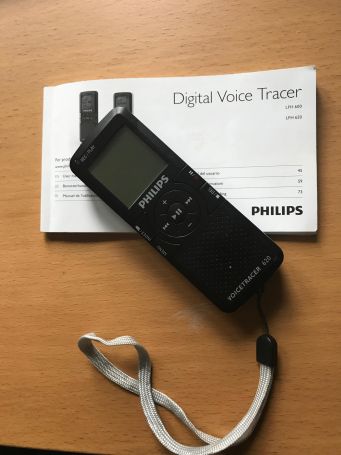
Digital Voice Tracer
The interior design fair takes place in Dubai’s World Trade Centre. The tallest building in Dubai when it opened in 1979, but now dwarfed by surrounding skyscrapers.
There are nearly 800 exhibitors. The exhibition halls are immense.
‘Contemporising Traditional Emirati Design’ Marge repeats to herself as she tackles the Main Hall, intrigued to see the ways one could do up one’s home if money was no object.
The next day, she returns for the talk on ‘Contemporising Traditional Emirati Design’, (an easy month for the editor – she nabbed all her ideas from the exhibition brochure). Unfortunately, the architect who’s giving the talk and who agreed to an interview with Marge is nowhere to be seen. Marge sends him a text.
“My apologies,” he replies. “My wife went into labour this morning. I’ve had to cancel. We’ve had a baby boy.”
Marge wants to be happy for him but now she can’t write her piece.
She visits the smaller halls, searching for inspiration, but in vain. The editor gave her one job. And a baby has messed it up.
Pity she can’t write a piece on the socio-economic infrastructure of Dubai instead; the layout of the fair typifies it perfectly.
The best exhibition halls are reserved for the movers and shakers of the western and Emirati interior design world. (Impossible not to generalise – the French and Italian stands are manned by young women, impossibly glamorous and not a little scary. The German stands by severe, grey-haired, middle-aged men who have no intention of talking to anyone. The Spanish stands entice with handsome, flirty boys handing out snacks and drinks. The English stands are neat and efficient, with amiable men and women on a mission to meet their targets. The smaller halls, poky, out of the way, are where the organisers have put the Asian and North African businesses. More souk than trade fair, stands hosted by men who don’t seem to know why they’re there, are either piled high with stuff that nobody wants, or are completely vacant except for a chair.
Marge emails the editor to advise her that it will now be difficult to write about Contemporising Traditional Emirati Design as the architect has gone on parental leave for the foreseeable future and can’t be persuaded to answer any questions, or even share the contents of his talk (Marge did try). The editor doesn’t reply.
An invitation, from someone Homer’s met through work, to a dinner party, cheers Marge up no end. He’s the CEO of a major global provider of 24-hour financial news and information, his wife a reporter with one of America’s news-based TV channels. Marge is excited. It’s sure to be an interesting evening.
Except that when Marge and Homer get to their house, which is stunning, the 16 guests are split onto two tables for dinner. The husband hosts one, by the fountain. The wife hosts the other, on the terrace. There’s a table plan. No one is sitting with their partners. Marge finds herself with complete strangers; some of the most boring men she’s ever met in her life, and three other women, one of whom makes it very clear that as the table’s Alpha Female she can only talk to the men. For four and a half hours (Marge lasts five) conversation covers, in minute detail, the SOS button in one of the men’s BMWs, the mooring fees at Jumeirah Beach Hotel for his yacht, and the cost of real estate on the Palm.
Alpha Female, sitting on Marge’s left, chips in with tales of her real estate company’s marketing initiatives. The host, on Marge’s right, his arm spread invasively across the back of Marge’s chair from the moment she sits down, lets off silent but deadly farts the entire meal. With barely ten minutes between wafts, by one in the morning, Marge, who (along with the other two women) is not spoken to and does not say A SINGLE WORD, is ready to scream, were she trying not to retch. Unable to catch Homer’s eye – he’s laughing so hard at something the hostess has said – Marge scrapes back her chair, forces Space Slob Fart Pants to remove his arm, and marching over to Homer’s table, announces that it’s time to go.
Continued here View From A Broad Part 28











Space Slob Fart Pants!! I’m belly chuckling
Thank you 😁